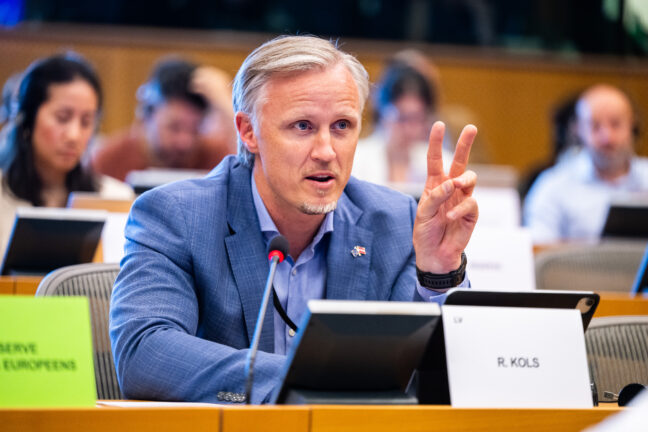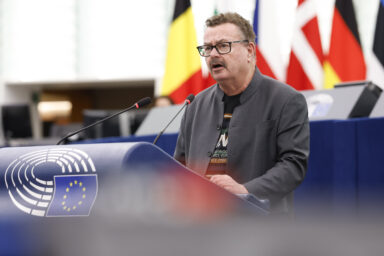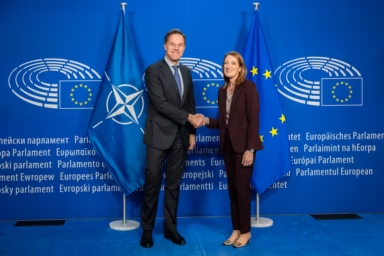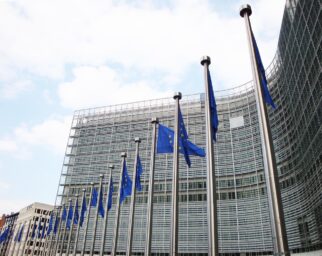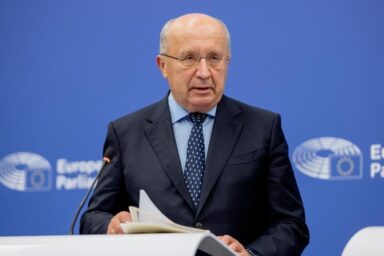The European Parliament is preparing to vote, during the October plenary, on the mini-defence omnibus, the first operational step of the broader Commission’s plan ReArm Europe/Readiness 2030. MEP Rihards Kols (ECR/LVA), rapporteur of the dossier, explained to EU Perspectives the details of the package, its objectives, and the challenges the European Union faces in security and defence. However, the European Parliament will not, as it turns out, vote for the omnibus just yet: the mandate to begin trilogues is announced, and the trilogues are set to begin soon. The Parliament will vote on the final compromise text “hopefully before the end of the year,” Kols’ team said.
According to MEP Kols, the mini-omnibus represents a rapid response to the growing complexity of European security, especially in light of the war in Ukraine and recent drone attacks in certain regions. “It does not create new financial instruments or programmes, but it reduces bureaucracy for the existing ones, paving the way for investments in defence sectors that have so far been almost ‘taboo’ under EU funds,” Mr Kols explains.
Five strategic programmes
The package focuses on five main programs. First, Strategic Technologies for Europe Platform (STEP) aims at strengthening European technological capabilities in strategic sectors. Second, Horizon Europe, historically focused on civilian research, now opens doors to dual-use projects — i.e. projects with both civilian and military applications — to allow innovative startups and small and medium enterprises (SMEs) to access funding even when traditional banks refuse to invest in emerging defence technologies. Third, European Defence Fund will include an increase in co-financing rates up to 100 per cent for SMEs engaged in innovative projects. Fourth, Digital Europe Programme supports digital applications relevant to defence, including AI gigafactories, cyber infrastructures, and cloud computing tools. Last but not least, the Connecting Europe Facility will implement key changes driven by the European Parliament, such as protecting critical infrastructure from sabotage and creating a dual-use fuel network essential for military mobility and energy resilience.
“These five programmes offer national governments a limited but significant window to redirect already allocated funds, such as cohesion funds or the Recovery Fund, toward priority projects without further burdening national budgets,” Mr Kols explains.
Consensus at European Parliament
The rapporteur highlighted the broad political consensus reached during negotiations: “Only five MEPs voted against, and four abstained; all others supported the measure with the aim of approving it as quickly as possible,” he said.
We decided to focus on what really matters: strengthening the defence industry, increasing technological capabilities, and ensuring the safety of European citizens. — MEP Rihards Kols (ECR/LVA)
According to MEP Kols, the clear message to member states is that European security can no longer wait. “There were attempts to add additional conditions or ideological criteria, but we decided to focus on what really matters: strengthening the defence industry, increasing technological capabilities, and ensuring the safety of European citizens,” he emphasizes.
Long-term vision: rearmament is not just ’readiness’
After the October plenary vote, the regulation will enter the trilogue phase between Parliament, Commission, and Council. Kols is optimistic that recent aggressions and threats in Eastern Europe will convince even the Council’s most cautious members to support the measure. The rapporteur notes that the mini-omnibus is not limited to immediate financial measures: “We have also included clear guidance in the recitals on future criteria, such as prioritizing projects that demonstrate European impact and cross-border cooperation, and the local use of materials to strengthen Europe’s strategic autonomy,” MEP Kols said.
On the broader level, Mr Kols defends the original name of the initiative, ReArm Europe. “The title ‘Readiness 2030’ was chosen for political reasons, but the real message is clear: we must show that we have the teeth to protect our citizens. The mini-omnibus is only the first step, preparing us for the larger Readiness 2030 package, which will reshape European defence policy in the coming years,” he explains.
You might be interested
We have reached an unprecedented consensus in the Parliament. Now we must turn this unity into concrete action. — MEP Rihards Kols (ECR/LVA)
In conclusion, the Latvian MEP emphasizes that time and unity are essential: “We have reached an unprecedented consensus in the Parliament. Now we must turn this unity into concrete action, strengthening our defence capabilities and European resilience in the face of current and future challenges.”
